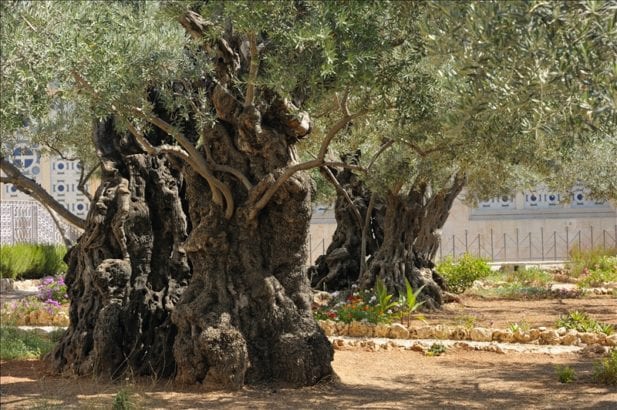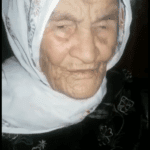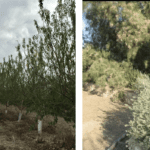
Garden of Gethsemane, East Jerusalem, occupied Palestine. This is one of the oldest olive trees in the garden (olive trees can live for thousands of years).
Dear Christians, let us never forget that the root of our faith is in Palestine, a real place that faces real suffering. Here is a glimpse of one family’s Gethsemane, and a call to stay awake.
by Kathryn Shihadah
Since I’ve been married to a Palestinian Muslim for 35+ years, and especially since I’ve been writing and advocating for the people of Palestine, my worldview has evolved dramatically, and my Christian faith experience has been transformed.
I’m not being political when I say this: as Christians, we should have a heart for these people who live in the land where Jesus walked.
But many of us are completely unaware of their existence, let alone their suffering.
I want to share with you a little about our Gazan relatives – to give you a glimpse into this rarely-seen corner of the world.
I’ve learned from them to look at life through the eyes of others, and that has changed everything. I pray it will stir your heart.

My husband and I have video chats with some of our Gaza relatives every other weekend or so – sometimes we can barely see them because their electricity is off. Three generations live together under one roof in a refugee camp; currently no one is employed. Other relatives live in the West Bank.
A few live scattered around Europe and South America, but most are in Saudi Arabia and Jordan, where they struggle with poverty. They were a middle class family a couple of generations back, but during the Nakba, they were forced to leave everything behind – twice for many of them, including my husband’s parents.
The trauma my husband endured as a 6-year-old hiding in ditches during the Six-Day War launched by Israel, and in the following years as a refugee, define much of his life.
Through several trips to Palestine and Israel, and through advocacy work in the US, I’ve gotten to know a number of Palestinian Christians, including the Rev. Dr. Mitri Raheb, who has worked tirelessly pastoring Christmas Lutheran Church in Bethlehem, writing books, and traveling the world to talk about peace and justice. He knows persecution firsthand, and will tell you that Christians in Palestine are not persecuted by Muslims, but by Jewish – or more precisely, Zionist – Israel.
(Dr. Raheb and and other giants in Christian service, including Rev. Naim Ateek and Patriarch Michel Sabah, created the Kairos Palestine Document, a must-read to understand how an indigenous Palestinian person of faith might view the Israeli occupation in the light of Scripture. It’s short but compelling!)
The struggle that Palestinian Christians (and Palestinians of other faiths) face can’t always be soothed with a simple reminder that “all things work together for good” – the line between shelter and homelessness, health and illness, even life and death, can be thin.
My husband and I have spoken to many Christian audiences about Palestine; again and again I’ve heard them exclaim, “I didn’t know! What’s happening is wrong!” This brings my husband joy – to know that in most cases, Christians just need to learn the facts, and they’re on board. He has always believed Christians are good-hearted and compassionate.
In fact, some Christian groups, denominations, and individuals have worked tirelessly on behalf of Palestinian human rights for decades – for example, Dead Sea scholar Millar Burrows and renowned journalist Grace Halsell, and the American Friends Service Committee (Quakers). One group, Bright Stars of Bethlehem, I have worked with for more than 10 years.
A few of our audiences are aligned with the occupier, and not open to our message. They believe Palestinians’ role in God’s story is one of loss – to relinquish their land to God’s chosen people because that’s God’s plan. They suggest that it would be less painful for the Palestinians if they’d just stop resisting and let God’s will be done (they may have been influenced by CUFI or the Scofield Reference Bible).
I can’t imagine Jesus saying, “quit complaining about injustice” – can you? He rewarded persistence (see for example Matt. 15:21-28, Mark 10:46-51, Luke 11:5-10) and prioritized justice (see Matt. 23:23).
Nor can I imagine that the divine plan of a merciful God would include God’s chosen people causing the suffering and ethnic cleansing of an entire people group in the very land where Jesus walked – can you?
No, God’s will includes life, not death; the pursuit of justice, not injustice.
But this isn’t the place for biblical exposition. I’ve written about that elsewhere (short version here, longer version here).
Gethsemane
Turning a corner, let’s look at a Holy Week passage that is probably familiar:
Then Jesus went with his disciples to a place called Gethsemane, and he said to them, “Sit here while I go over there and pray.” He took Peter and the two sons of Zebedee along with him, and he began to be sorrowful and troubled.Then he said to them, “My soul is overwhelmed with sorrow to the point of death. Stay here and keep watch with me.”
Going a little farther, he fell with his face to the ground and prayed, “My Father, if it is possible, may this cup be taken from me. Yet not as I will, but as you will.”
Then he returned to his disciples and found them sleeping. “Couldn’t you men keep watch with me for one hour?” he asked Peter.“Watch and pray so that you will not fall into temptation. The spirit is willing, but the flesh is weak” (Matt. 26).
In Jesus’ most profound hour of need, he didn’t want to be alone. He gave the disciples one job – to keep him company. Jesus knew they wanted to do it, but he also knew they could be unreliable. So he told them to pray. Instead, they dozed. Three times.
Many American Christians – including me – can relate to the disciples. We have good intentions, but we’re too busy or too easily distracted to give Jesus our all. We need to do better. (To those Christians who are already fighting the good fight for a just world: thank you, and please take our hands and bring us with you.)
Now, I’m about to take a leap, so fasten your seat belt.
While many of us identify with the disciples in Gethsemane, I see a connection between Palestinians and Jesus in the story. Palestinians are in their own Gethsemane – most have spent their entire lives in Gethsemane, asking God to deliver them from suffering.
My husband’s 94-year-old aunt Zahiyya was just 21 when she and her family fled their village of Ibdis in 1948. That’s when her Gethsemane began. Her memories of bombings and massacres by Israeli soldiers are vivid and terrible. She parted ways with her twin sister in 1948, and never got to see her again. Each of Zahiyya’s 10 children and dozens of grandchildren and great-grandchildren is haunted by his/her own trauma as well – for example, our 24-year-old niece was 11 during the 2008-2009 Israeli invasion into Gaza, and a teenager when Israel attacked again in 2012 and 2014. What kind of baggage did she bring into adulthood?
(Our niece is of course not unique. UNICEF estimates that 40% of Palestinians are under 18; anyone in Gaza over the age of 7 has lived through at least 1 “war.” In the 3 times of open hostility – and the times of “peace” between them – Israel has killed 4,500 Palestinians; in the same time period, 106 Israelis have been killed.)
American Christians, we can do better. We need to gather in greater numbers behind the cause of the Palestinians. We need to be better attuned to their historic suffering and daily abuse, and advocate for justice. Why us? Because Americans are subsidizing this ongoing atrocity – to the tune of $19 million a day.
The tormentors
When Jesus’ tormentors came to arrest him, he faced them with perfect composure. Of course, Palestinians are not a perfect reflection of Jesus. A lifetime as a victim of injustice can distort reality and steal hope, causing an individual to lose patience or stop believing in God’s ways – and take matters into his own hands. That is a universal human response. (I suspect that if Americans were similarly subjugated and/or expelled from our country, some would fight back anyway they could.)
We know how things went for Jesus once his enemies got ahold of him. The disciples abandoned him, he was stripped, whipped, and dragged around Jerusalem to face religious and Roman leaders. Again and again, he endured false accusations and beatings; he was wrongfully convicted and sentenced to death.
The people who should have borne witness to his innocence were either hiding or part of the mob that watched him die.
Palestinians are brought before the court of public opinion daily, where Israel and its spokespeople bear false witness against them; Palestinians find themselves in the Israeli military court system, where no justice can be found; Palestinians in Gaza are sentenced to death without a trial – a slow death by starvation, or a speedy death by sniper or airstrike.

“You have done it to me”
Of course, most Christians see the crucifixion of Christ as an atonement for our sins – making his death meaningful.
But Palestinian deaths – whether from Covid, or being shot by a sniper, clubbed by a settler, slowly starved by a blockade, or in a suicide attack (the last fatality from such an attack was in 2008) – these are just lives gone to waste.
Jesus instructed his followers to give aid to those who need it. By so doing, we know we are in a sense giving aid to Jesus himself (Matt. 25:40-45).
I wonder whether, as we celebrate Jesus’ selfless gift to us, we can begin to take up the cause of this precious community living in Gethsemane in the land where Jesus once walked. It is not political to call for justice for the oppressed.
Easter is a time of new hope and new life – two things that Palestinians desperately need.
An excellent resource for learning about Christianity and the State of Israel is christianzionism.org
Kathryn Krause Shihadah is a Christian raised in the Lutheran denomination in Illinois, where her parents owned a Christian bookstore. She attended Christian schools, including college, where she received intensive Bible instruction, and has continued these studies throughout her adult life.
Her particular interest in Scripture as it relates to the Holy Land was sparked by her husband Ziyad, a Gazan refugee who asked her the simple but penetrating question, “why do Christians seem to hate Palestinians?”
Kathryn Shihadah is staff writer for If Americans Knew. She blogs at Palestine Home and writes for the faith-based website Patheos.
ESSENTIAL READING:
- Introduction: What does the Bible really say about modern Israel?
- What does the Bible really say about modern Israel?
- Israel is not as Christian-friendly as you think
- Timeline of Israeli and Palestinian deaths
VIDEOS:



